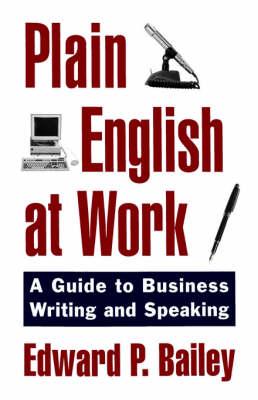Overview
Everyday we write countless memos, letters, and reports without a second thought. Likewise, we give presentations, both formal and informal. Often this writing and speaking gets criticized for being jargon-ridden, obscure, or long-winded--in short, for not being in ""plain English."" But what is plain English, and how do we go about writing and speaking it? In Plain English at Work, Edward Bailey gives the answer, with down-to-earth tips and practical advice. Bailey, an expert in business communication, gives us a simple model for writing: BL Style: write more the way you talk. BL Organization: make your point easy to find. BL Layout: use headings, lists, and other white space so readers can see the structure of your writing. Psycholinguists, Bailey points out, have proven that the techniques of plain English writing are far easier on your readers; experience has proven that writing in plain English is easier on you--the writer, too. Bailey also gives you a wealth of practical advice for presentations including: BL How to remember your talk. BL How to design visual aids. BL How to design computer presentations. BL How to set up the room you'll be speaking in. BL How to develop a successful delivery style. Perhaps most impressive are the many detailed tips he gives here. For instance, when using a pointer, hold it in the hand closer to the screen (otherwise, you turn your back on the audience, making it harder to hear you). When designing a visual aid, use at least 28-point type, and seldom use all capital letters (which are harder to read). And when presenting a bar chart during a computer presentation, build it--a bar at a time--to focus your audience's attention. Drawing on two earlier and popular books, The Plain English Approach to Business Writing and A Practical Guide for Business Speaking, this new volume has been significantly updated. It includes up-to-the-minute information on using computers, computer graphics, and typography for your writing, and on using the same technology for designing your presentations. The result is an authoritative and comprehensive single volume that will be the essential guide for everyone wishing to communicate more easily and effectively at work.
Full Product Details
Author: Edward P. Bailey (Professor of Business Communications, Professor of Business Communications, Marymount University)
Publisher: Oxford University Press Inc
Imprint: Oxford University Press Inc
Dimensions:
Width: 14.80cm
, Height: 3.00cm
, Length: 21.80cm
Weight: 0.499kg
ISBN: 9780195104493
ISBN 10: 0195104498
Pages: 304
Publication Date: 05 December 1996
Audience:
Professional and scholarly
,
Professional & Vocational
Format: Hardback
Publisher's Status: Active
Availability: To order

Stock availability from the supplier is unknown. We will order it for you and ship this item to you once it is received by us.
Reviews
"""Another splendid book. Ed has exactly the right touch for blending the academic with the practical.""--James C. Gaston, President, Word One Associates, Inc. ""Brilliant! Bailey cuts to the heart of the problem time and again in this book. His advice eliminates the fog from business memos and the pain of composing them.""--James S. O'Rourke, University of Notre Dame"
Another splendid book. Ed has exactly the right touch for blending the academic with the practical. --James C. Gaston, President, Word One Associates, Inc. Brilliant! Bailey cuts to the heart of the problem time and again in this book. His advice eliminates the fog from business memos and the pain of composing them. --James S. O'Rourke, University of Notre Dame
Author Information
Edward Bailey has a national reputation as an expert in business writing and speaking. A consultant to top clients in business and government, he is Professor of Business Communications at Marymount University near Washington, D.C.




